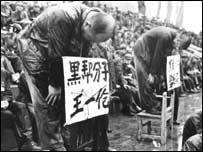Thanks to IdleDays who, in a comment, referred me to a most thought-provoking article by Pico Iyer on how America would be well-served to learn from its friends in Asia to get over its self-defeating grief over September 11th and move on.
I’m not endorsing this necessarily, but his argument is interesting. (Iyer is one of my very favorite journalists; he wrote the article about the Tiananman Square tank man that may just be the most moving thing I’ve ever read. If you have never read it, go read it now.)
He contrasts the tendency of Americans to dwell on their grief with the old Asian tradition of acknowledging a tragedy, learning from it and moving on:
Whether out of pragmatism or real moral clarity, the old cultures of Asia, famous for their worship of ancestors, have often shown themselves ready to learn from their descendants.
To many on this side of the world, therefore, America’s dwelling—and dwelling—on its losses of two years ago appears unseemly. The firemen who gave their lives in the World Trade Center are heroes to inspire the world. And most Muslims regard the assault of a few fanatics as a blot on their religion, not a triumph. Yet America, determined not to look up from the event and to keep brandishing its wounds before the world, looks at times like an angry child who lacks the perspective of his elders. When a troublemaker tries to provoke you, even schoolboys know that you get the best of him by turning away and going about your business. Each time the U.S. revisits its sorrow, it provides Osama bin Laden with another victory and lives down to the terrorists’ caricatures of it.
This is a controversial viewpoint of course, as in very, very controversial. But as I’ve said before, I wish Americans had a better knowledge of how the world perceives it, and whether I agree with Iyer or not, I know that everyone here does.
He points out the hardships that have been put up with here, from Pol Pot’s murder of millions and millions, to the 120,000 Bangladeshis who drowned in a flood in 1991, and America’s relative lack of awareness, let alone concern.
I am not sure if the comparison is a fair one. It would be wonderful if grief were always distributed evenly to everyone who suffers. But it is only natural for America to be more affected by the death of its own than for those far away, who seem to at least some extent an abstraction. I, for one, feel that grief over 911 is valid; the wound is still fresh. I get very upset thinking of Chinese students locked up for writing essays, but my upset over 911 is more intense and more personal. It happened where I grew up and lived. It could have been me or my friends.
And there seems to be a contradiction, or at least a complication, in Iyer’s argument. While he begins by saying it is time we “get over it,” he then indicates that maybe it really isn’t that time yet, but Asia is impatient with our grief now because the US post-911 has been such an asshole:
Everyone who suffers a terrible loss grieves over it and remembers its anniversary; not to do so would seem scarcely human. And in the case of America, which has been shielded for so long from terrorism at home, the 9/11 attacks possessed a force that more weathered cultures have forgotten. But the older cultures, having extended a hand toward America at its time of need, can reasonably feel now that the U.S., in its rage, has swatted them away. And the imbalance of the world—whereby so much power and money lie with one of its youngest nations—is compounded by that deeper imbalance whereby almost every nation knows more about America than America knows about every other nation.
So is this really about learning from our enlightened Asian friends, or is it just another example of the ressentiment against America that’s so fashionable nowadays? No, I believe Iyer is too intelligent for that. I think he’s trying to underscore the phenomenon of America’s ignorance of how “older and wiser” nations perceive us, but I think his argument is fragile. If it’s this way five years from now, I’ll be more inclined to agree.

Comment